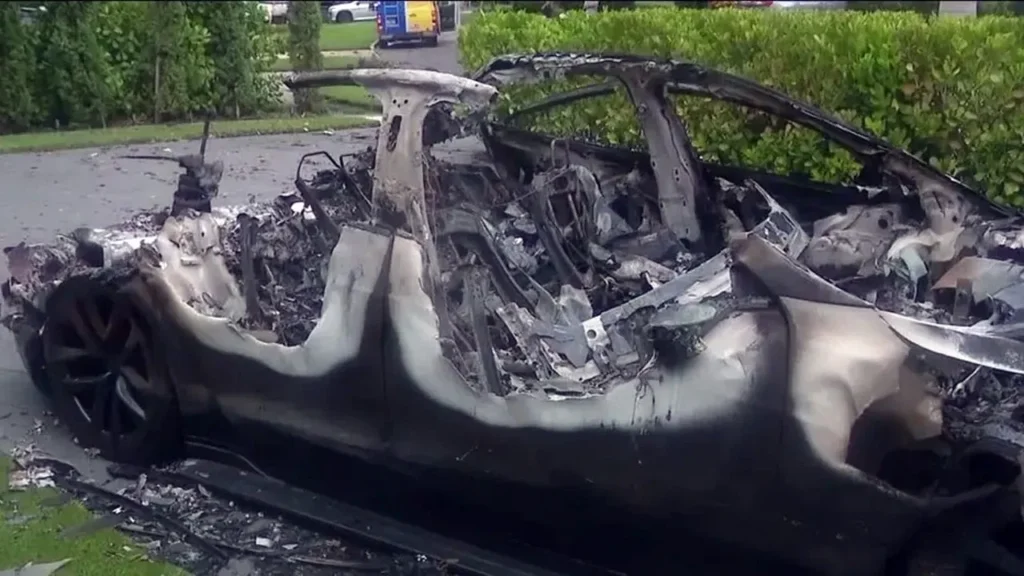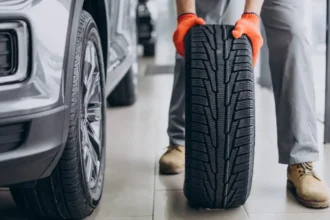In the aftermath of hurricanes, we’re accustomed to hearing about storm surges, fallen trees, and flood-damaged homes. But a new danger is emerging as electric vehicles (EVs) and electric scooters are becoming more common on our roads: the risk of lithium-ion batteries exploding after being exposed to floodwaters. Could your electric vehicle burst into flames after a hurricane? Let’s dive into the facts to understand the risks and how you can stay safe.
The Hidden Danger: Lithium-Ion Batteries and Water Don’t Mix
When Hurricane Helene swept through Tampa, Florida, the storm left a path of destruction. Among the many challenges faced by residents and first responders, a troubling pattern emerged: electric vehicles and scooters catching fire after being submerged in floodwaters. One particularly shocking incident involved a house fire on the upscale Davis Islands, where an electric vehicle in the garage likely exploded after its lithium-ion battery came into contact with water.
Tampa Mayor Jane Castor described the destruction: “Water and ion batteries do not mix. They literally explode.” She witnessed the aftermath from a helicopter, noting that only one wall of the home remained standing. Other reports also confirmed several rentable electric scooters exploding in the floodwaters, sparking further concerns about the safety of these devices during severe weather events.
Why Do Lithium-Ion Batteries Explode When Wet?
Lithium-ion batteries are incredibly efficient at storing large amounts of energy in compact forms, which is why they’re used in everything from electric cars to scooters, phones, and laptops. However, this same power can turn deadly when these batteries are exposed to saltwater.
The interaction between saltwater and the battery creates a highly conductive environment that can lead to short circuits. When a battery short-circuits, the internal components heat up rapidly, and in extreme cases, this can cause the battery to ignite or even explode.
As Rob Herrin, public safety information chief for Hillsborough County Fire Rescue, explained, “The danger with lithium-ion batteries is that there’s a lot of power in a small package. When that energy is released, it’s a tremendous amount of heat.” This heat, combined with the reactive nature of lithium, can trigger catastrophic fires, making submerged vehicles a real hazard after a hurricane.
Real-Life Incidents: A Growing Problem
The case of Hurricane Helene isn’t the first time electric vehicles have posed a fire risk after flooding. Following Hurricane Ian in 2022, around 20 electric cars caught fire after being submerged in saltwater. The problem has become so prevalent that fire departments across Florida are now issuing warnings to EV owners in flood-prone areas.
For instance, after Hurricane Idalia, Florida’s Palm Harbor Fire Rescue urged EV owners to relocate their vehicles if they had come into contact with saltwater: “Saltwater exposure can trigger combustion in lithium-ion batteries. If possible, transfer your vehicle to higher ground.” This advice isn’t just for electric cars—it applies to any vehicle or device with a lithium-ion battery, including scooters and e-bikes.

How to Protect Your Electric Vehicle During a Hurricane
If you live in a hurricane-prone area and own an electric vehicle, you might be wondering how you can protect your car and yourself from this risk. Here are some essential steps to minimize the danger:
1. Move Your EV to Higher Ground Before the Storm
- If you know a hurricane is approaching, the best thing you can do is relocate your EV to an area that is less likely to flood. Park it on higher ground, and if possible, avoid parking in enclosed spaces like garages that could trap the fire.
2. Disconnect the Battery if Your EV Gets Flooded
- If your vehicle is exposed to floodwaters, you should avoid starting it. Disconnect the battery, and have a professional inspect the car before you attempt to drive it. Never handle the battery yourself, as water exposure makes it highly volatile.
3. Regularly Monitor Weather Warnings and Evacuation Alerts
- Stay updated on local weather forecasts and alerts, especially regarding flood risks. Keeping your car safe from storm surges or flood-prone areas could prevent dangerous situations.
4. Avoid Using Scooters or E-Bikes in Flooded Areas
- Electric scooters and e-bikes have become a convenient form of transportation, but they can be just as dangerous in floodwaters. Avoid riding or leaving them in areas susceptible to flooding, and secure them before a storm hits.
5. Consult Your Manufacturer’s Guidelines
- Check the safety recommendations from your vehicle manufacturer regarding flood risks and battery care. Different manufacturers may offer various suggestions for how to handle your vehicle in an emergency situation.
Why Electric Vehicles Are Vulnerable After Hurricanes: Understanding the Science
Floodwaters, especially those mixed with salt, can lead to a phenomenon known as “thermal runaway.” This occurs when a battery cell is damaged or short-circuited, leading to a self-sustaining reaction that generates more heat than can be dissipated. As the temperature rises, the other cells in the battery can begin to break down, eventually leading to a fire or explosion.
This process can happen rapidly or take several hours to develop, which is why some EVs may appear fine immediately after a flood but then catch fire later. The fact that water can infiltrate small cracks in a battery’s casing means that even a brief submersion can pose a serious risk.
Here’s a breakdown of the process:
| Step | What Happens |
|---|---|
| Saltwater Exposure | Saltwater enters the battery housing, causing a short circuit between the battery’s terminals. |
| Heat Generation | The short circuit generates significant heat, which starts to break down the battery’s internal structure. |
| Thermal Runaway Begins | As heat increases, a chain reaction starts within the battery, causing rapid decomposition of materials. |
| Fire or Explosion | Eventually, the heat and gas buildup can cause the battery to catch fire or explode. |
The Role of Electric Scooter Companies: Are Shared Scooters Safer?
While personal electric vehicles are at risk, what about rentable electric scooters? Companies like Lime and Spin have made efforts to ensure their scooters are designed to resist water damage. Spin’s spokesperson, Bruno Lopes, stated that 99% of their scooters were disabled and secured before Hurricane Helene hit Tampa. These measures are critical, as submerged scooters could otherwise become explosive hazards.
However, Spin’s safety claims emphasize that the danger primarily lies with personally owned devices. “These concerns are more common with personally owned devices, which may not meet the same rigorous safety standards as those in the shared mobility industry,” said Lopes. Shared scooters are often better sealed to prevent water intrusion, but that doesn’t mean they’re immune to damage in extreme weather.
FAQs: Common Questions About EV Fires After Hurricanes
1. Can any electric vehicle catch fire after being submerged in water?
Yes, any electric vehicle with a lithium-ion battery is at risk if submerged in floodwaters, particularly saltwater. The salt increases the likelihood of short circuits, leading to potential fires.
2. How soon after flooding can an EV catch fire?
Fires can happen immediately or even days after the vehicle has been exposed to water. The fire risk is ongoing as long as the battery remains damaged and unaddressed.
3. Are hybrid vehicles at risk too?
Yes, hybrids that use lithium-ion batteries face similar risks as fully electric vehicles when exposed to floodwaters.
4. What should I do if my electric car is flooded?
If your EV has been exposed to floodwater, do not attempt to drive it. Disconnect the battery and contact a professional to inspect the vehicle before use.
5. Are there any preventative measures manufacturers are taking?
Yes, many EV manufacturers are enhancing waterproofing techniques and improving battery management systems to reduce the risk. However, there is no foolproof solution to prevent fires in severely flooded conditions.
Conclusion: Protecting Your Electric Vehicle in Hurricane-Prone Areas
As electric vehicles become more common, the risk of fires caused by flooded lithium-ion batteries is a growing concern. While manufacturers and scooter companies work to improve safety, EV owners must take proactive steps during hurricane season. Understanding the risks, moving your vehicles to higher ground, and being cautious after a storm can protect yourself and your property from potential disasters.








